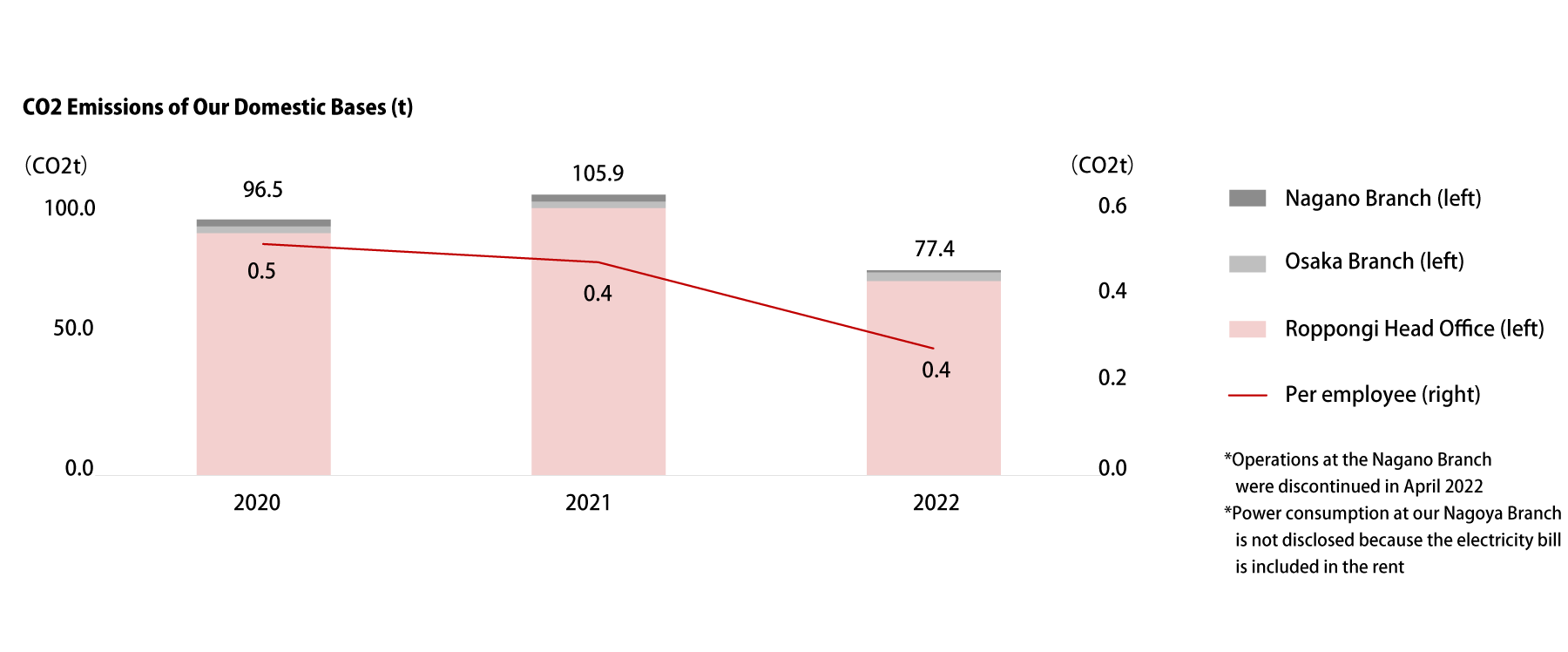Frontier Management
Basic Policy
for Sustainability
Since its establishment, the Frontier Management Group has been operating under the corporate mission
“Contributions to the benefit of clients”, “Contributions to the benefit of stakeholders”, and “Contributions to society”.
By bringing together the intelligence and wisdom of a diverse team of professionals to assist clients in solving their management issues, the Group will contribute to a thriving global environment and a sustainable society while achieving sustainable growth and development for the Group itself.
Sustainability
Key Themes and Materiality
Key Theme |
Materiality |
|---|---|
Establishing diversity and expertise of human resources |
|
Contributing to a shift in the shape of society and business |
|
Strengthening corporate growth potential and resilience |
|
Formulating Materiality
the Logical Structure of Our Basic Policy for Sustainability
Since its establishment, the Frontier Management Group has been operating under the corporate mission “Contributions to the benefit of clients”, “Contributions to the benefit of stakeholders”, and “Contributions to society”.
By bringing together the intelligence and wisdom of a diverse team of professionals*1 to assist clients in solving their management issues*2, the Group will contribute to a thriving global environment and a sustainable society*3 while achieving sustainable growth and development for the Group itself*4.

TCFD Disclosures
Initiatives to Address Climate Change
The Frontier Management Group will contribute to the fight against climate change by promoting the reduction of its greenhouse gas emissions and environmental footprint, and by actively supporting our corporate clients as they shift to new business models to build a sustainable global environment and society.
We will disclose climate change-related information in accordance with the TCFD framework: Governance, Strategy, Risk Management, and Metrics and Targets.
Governance
To contribute to sustainability throughout the Group in the medium- to long term, our Group established a Basic Policy for Sustainability, the Materiality of Sustainability Issues to be prioritized by the Group, and a Sustainability Promotion Committee in November 2022.
Organization overview
- Meetings of the Sustainability Promotion Committee are held regularly to discuss how to address priority issues related to sustainability.
- The Sustainability Promotion Committee reports the status of the sustainability priority issues to the Board of Directors and receives directions.
- The status of risk measures by the Sustainability Promotion Committee is monitored by the Risk Management Committee, and regularly reported to the Board of Directors twice a year.
Strategy (1) Risks and Opportunities of Climate Change
Our Group conducted a scenario analysis based on the risks and opportunities brought about by the climate change.
In the scenario analysis, we analyzed the financial impact in 2030 on our mainstay business, consulting and advisory services, for two assumed scenarios: a 1.5°C scenario in which the impact is manifested in terms of transition and a 4°C scenario in which the impact is manifested in physical terms.
For the magnitude of the financial impact, we set our operating income for the term ending December 31, 2023 to 100, with “Major” representing more than 30%, “Medium” representing 10% to less than 30%, and “Minor" representing less than 10%.
While natural disasters and the like caused by the climate change were found to have a negative impact on the consulting and advisory business, the demand for these services may increase as companies go through the transition to a decarbonized society and adapt to climate change.
【The 1.5°C scenario】
In this scenario, the temperature increase in 2100 will be suppressed to about 1.5°C above pre-industrial levels.
To address climate change, reductions in greenhouse gas emissions and environmental impacts will be promoted, and this will lead to increased transition risks in terms of policy regulations, markets, and so forth.
【The 4.0°C scenario】
In this scenario, the temperature increase in 2100 will be about 4°C above pre-industrial levels.
Insufficient measures to address climate change will result in higher physical risks, such as an increase in extreme weather events.
Strategy (2) Risks and Opportunities of Climate Change
■Analysis of Financial Impact in 2030
| Category | Item | Impact on Business | Risk or Opportunity |
1.5℃ Scenario |
4℃ Scenario |
|
|---|---|---|---|---|---|---|
| Transition risks/opportunities | Political measures, laws and regulations | Introduction of carbon pricing (carbon tax, etc.) | If there is a sharp increase in financial burden, such as a carbon tax, this could have a negative impact on our business performance. | Risk | Minor | - |
| Tightening of environmental regulations on CO2 emissions | If there is a sharp increase in energy costs due to higher prices for renewable energy, this could have a negative impact on our business performance. | Risk | Minor | - | ||
| Social evaluation | Requests from stakeholders | If our stakeholders’ interest in the transition to a decarbonized society and the status of our adaptation to climate change increases rapidly and our response is too late, our social evaluation could be lowered, resulting in a negative impact on our business performance. | Risk | Minor | - | |
| Political measures, laws and regulations | Introduction of carbon pricing (carbon tax, etc.) | If business conditions at our client companies deteriorate due to increases in burdens such as carbon taxes, there may be increased demand due to needs for M&A advisory and management consulting such as support for management improvement and rationalization. | Opportunity | Minor | - | |
| Market (trends) | Accelerated transition to decarbonized society | If requests for Japan’s transition to a decarbonized society and the adaptation to the climate change accelerate and client companies are forced to act by changing their business models or the like, there may be increased demand from needs for management consulting and M&A advisory. | Opportunity | Medium | - | |
| Expansion of environmental awareness among stakeholders | If the interest of stakeholders in the transition to a decarbonized society and the status of the adaptation to climate change increases, requests for information disclosure accelerate, and client companies are suddenly forced to react, there may be increased demand from needs for management consulting. | Opportunity | Minor | - | ||
Strategy (3) Risks and Opportunities of Climate Change
■Analysis of Financial Impact in 2030
| Category | Item | Impact on Business | Risk or Opportunity |
1.5℃ Scenario |
4℃ Scenario |
|
|---|---|---|---|---|---|---|
| Physical risks/opportunities | Chronic | Changes in climate patterns, such as rising average temperatures, due to the climate change | If our employees work with lower efficiency or there is a decrease in active personnel caused by more people suffering from heat stroke or other diseases, this could have a negative impact on our business performance. | Risk | Minor | Minor |
| Acute | Extreme weather events such as heavy rainfall or flooding due to the climate change | If a natural disaster paralyzes transportation for an extended period of time, preventing employees from going to work or visiting clients, this could have a negative impact on our business performance. | Risk | Minor | Minor | |
| If a natural disaster causes a power outage and stagnation of business activities for an extended period of time, this could have a negative impact on our business performance. | Risk | Minor | Medium | |||
| Outbreaks of infectious diseases such as Japanese encephalitis, malaria, and dengue fever due to global warming | If an outbreak and spread of an infectious disease affects cross-border projects due to restrictions on overseas travel, this could have a negative impact on our business performance. | Risk | Minor | Medium | ||
| If an outbreak and spread of an infectious disease forces us to suspend some of our business due to a decrease in active personnel caused by a mass infection of client employees/our employees, this could have a negative impact on our business performance. | Risk | Minor | Medium | |||
| Chronic, acute | Rebuilding of BCP measures of clients | If client companies are forced to rebuild their BCP measures (measures against water damage, consideration of base location and relocation of bases, review of companies in the value chain) due to the impact of natural disasters, there may be increased demand from needs for management consulting. | Opportunity | Minor | Medium | |
Risk Management
Our Group has positioned climate change risks as priority risks. A Risk Management Committee forecasts and appropriately evaluates operational risks and establishes measures to avoid, mitigate, and transfer those risks. The status of the measures and the like is regularly reported to the Board of Directors. Specifically, we manage risks as follows.
- Identify and update risks.
- Determine the severity of each risk by considering its frequency and the magnitude of its impact (risk analysis) and establish a priority order (risk assessment).
- Determine a policy for response and establish preventive measures as suitable for the nature of each risk (risk measures).
- Evaluate the response status using five evaluation levels (monitoring/evaluation).

Metrics and Targets
Frontier Management Inc. aims to achieve a “net zero” in carbon dioxide emissions.
- To shift office electricity to renewable energy, we switched our head office in Roppongi, Tokyo, to green power in September 2022.
- By the term ending in December 2030, we will reduce greenhouse gas emissions by 50% as compared to the term ending in December 2021.
- By the term ending in December 2050, we will reduce greenhouse gas emissions to net-zero.
- We are working to reduce the amount of single-use plastics in our offices.
- We encourage climate-friendly business travel by our employees.
- We actively support our client companies for the shift to a decarbonized and recycling-oriented society.

next contents
contact us
Please address any inquiries to
Frontier Management Inc. here.



